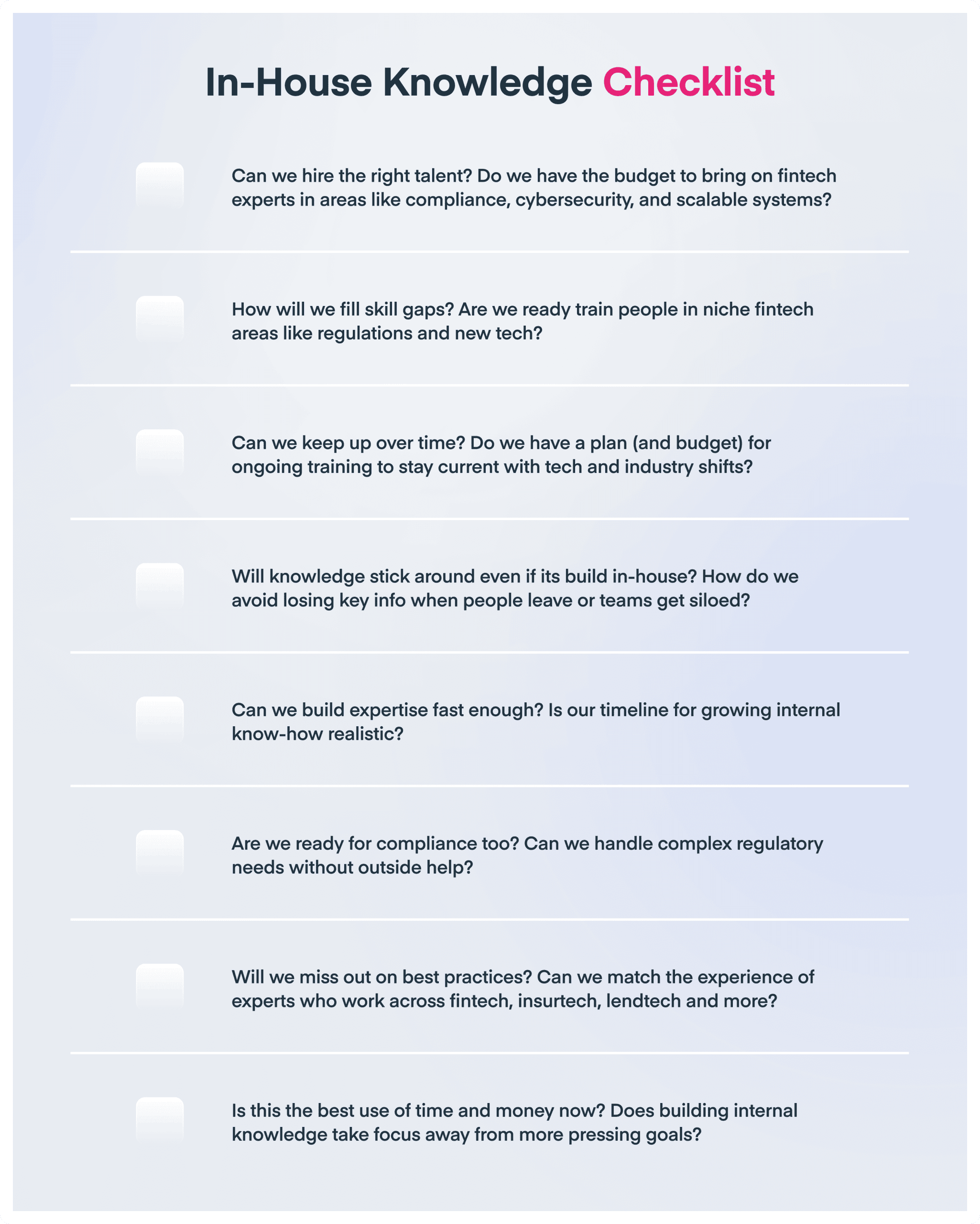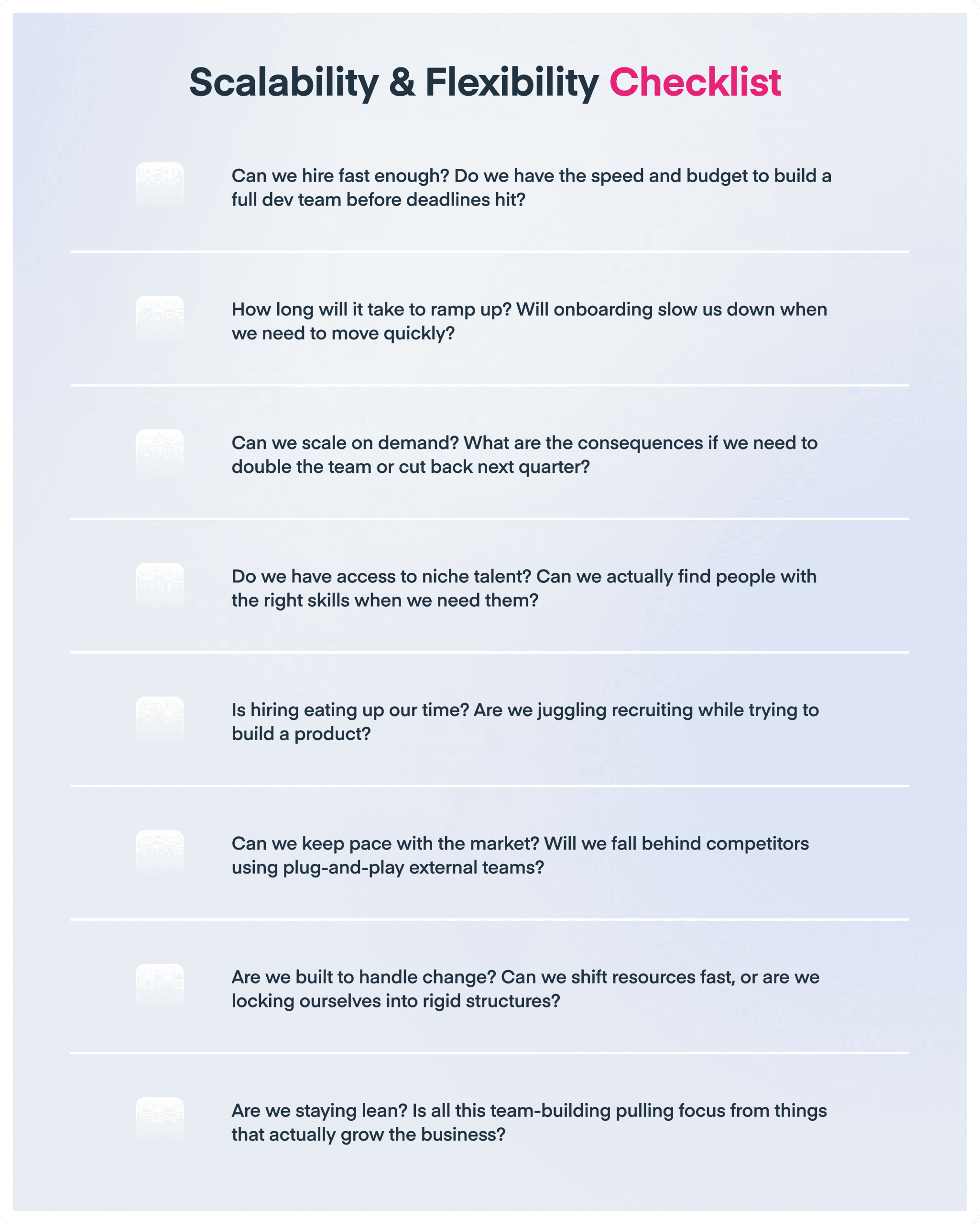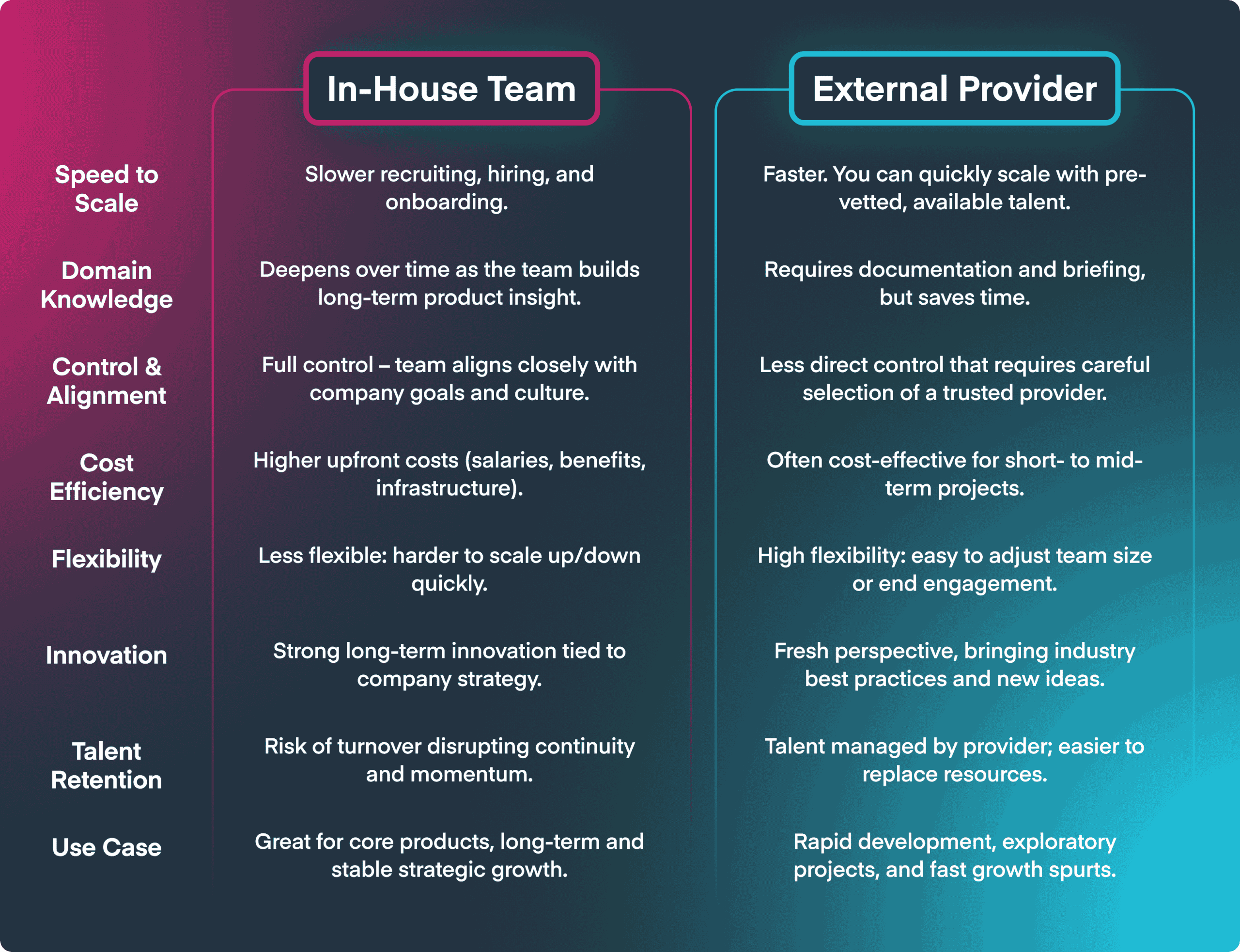About to build an internal team from scratch? Hold off on that kickoff call for just the next 5 minutes.
Because “we’ll just hire in-house” is easy to say. Right up until the budget bloats, your managers start taking burnout sabbaticals, and you’re fast-tracking interviews for roles you didn’t even know you needed. That’s not a sign of your shortcomings so much as it’s just the nature of the beast.
Hidden costs and scope creep don’t politely announce themselves. And in finance and insurance? Lack of niche expertise doesn’t just slow you down, it gets you in trouble and can stall (or cancel) your launch.
Yes, in-house teams can be great. But, are you sure you aren’t rushing to buy before you rent? A hybrid setup, or even outsourcing to a specialized team might get you what you’re actually after.
Why even consider an external team?
Let’s summarize it. External collaboration can: save time, reduce costs, and gain access to specialized knowledge without long-term commitments. These collaborations also open the door to innovation, new market opportunities, and improved efficiency. External collaboration helps businesses stay agile, competitive, and better equipped for long-term success.
We put together this guide which covers these various angles to consider and handy checklists to consult with your team.
What will end up working best for you? A full-in house team, an external provider, or a hybrid model?
To develop internal knowledge or not to develop internal knowledge
A common hesitation with external development partners is the fear of losing control over internal knowledge-building. It’s a valid concern: if the people writing your code aren’t on your payroll, how do you keep critical expertise in-house?
But partnering externally doesn’t mean sacrificing know-how, it just requires the right processes. Clear knowledge capture procedures and strong business continuity plans ensure expertise isn’t lost when people move on.
The best service providers don’t wait for projects to start, they’re always recruiting. That means you get access to experienced developers ready to contribute from day one. When integrated properly, they don’t just add capacity, they bring insights that elevate your product and your team.
And while they may not be full-time employees, their contributions still stick. Their skills feed into your systems, and in many cases, they can even work on-site with your team giving you expert support with close alignment.
Success comes down to planning: with the right partner and integration strategy, external development can build your product and strengthen your internal capabilities.

Save this checklist to discuss with your team
How quickly do you need to scale and innovate?
You may already have a successful product, but now the pressure is on to expand or deliver something new. Whether that’s launching a service, adding a feature set, or responding to a fast-changing market. Staying competitive means moving quickly, with experienced developers who understand your industry and can deliver from day one. But it can be risky to make bold moves without a team dedicated to building up an idea.
Building an in-house team for a new undertaking takes time. It’s a lengthier process than we sometimes give our recruitment and HR teams credit for:
- Defining job descriptions to attract the right candidate
- Outreach and lengthy email chains
- Interviewing, testing, and vetting candidates
- 1-3 months of onboarding
- Retention and successful training of new candidates
And that’s assuming you find the right talent, sometimes no matter how good someone looks on paper, they can clash in unexpected ways or lack specific expertise in practice. All the while, competitors are already shipping.
External development teams offer a faster path. They’re built to scale. The best providers don’t wait until projects show up, they’re actively recruiting and curating top-tier talent across disciplines. That means when you’re ready to move, they’re ready to go.
A strong external partner brings not only speed but adaptability. Whether you need to staff up for a short-term sprint or lay the groundwork for long-term support, they provide the flexibility to match your pace without slowing you down with overhead.
It’s true that building an internal engineering team can have benefits for long-term scaling and ownership, but only if you have the time, resources, and management capacity to do it right. For many companies, that’s a significant investment with delayed payoff. If speed, expertise, and focus are your priorities, a trusted external partner can get you there faster and more efficiently.

Save this checklist to see how you’ll fare when you scale
Less time managing, more time building
Working with an external team doesn’t mean giving up control. It means finally ditching the added headache of managing every hiccup, holiday, and 2 a.m. Slack message. It’s not giving up your lead, it’s reclaiming focus.
Sure, you’ll still need someone on your side to steer the ship and coordinate with the partner team. But you won’t be stuck refereeing time zones, fixing team morale, or decoding tone in a passive-aggressive pull request.
A solid external partner brings their own project manager, whose full-time job is making sure things run tight and deliver on time. They manage the humans so you can manage the product. They handle communication styles, energy dips, personality friction, and all the things that quietly eat your calendar.
This setup gives you access to talent without inheriting the overhead. You’re not dragging more people into your daily standups, you’re clearing space for strategy, vision, and actually shipping.
Because here’s the truth: you don’t need to manage every moving part. You need to move the whole thing forward. And the right external partner makes that possible without miring you down in the day-to-day operations of building a new product.

Save this checklist to mitigate management woes
What about the cost?
One of the biggest perks of working with an external dev team? You’re not burning the budget on overhead. You’re not locked into full-time salaries for roles you might only need for six months. You’re paying for outcomes: not chairs, laptops, and annual reviews. It can also clear up resources to help you take better care and retain your existing team.
And when the scope changes (because of course it does), you scale the team up or down without the commitment of hiring someone longterm or potentially letting go of someone who really didn’t deserve it, giving your company a bad reputation as an employer.
Now let’s be clear: lower cost doesn’t mean lower standards. If you’re saving money but shipping garbage, that’s not efficiency, that’s technical debt just waiting to trip you up at a crucial moment.
That’s why the vetting matters. A good partner can show their track record without blinking. They’ve done this before. They’ve delivered real work, with real talent, for real companies. Ask how they maintain quality. Ask who’s on their bench. If they stumble, keep walking.
If you want to control spending, stay flexible, and still get access to the kind of talent that moves the needle an external team isn’t a compromise. It’s a strategic decision.
Not sure how to vet an external partner?
Here are 10 solid questions to ask a potential external partner:
- Realistic Presentation
Do they say no or admit gaps in knowledge? This is a good sign, no responsible developer is going to promise you the moon and stars. - Proven Track Record
Check their portfolio and past projects. Have they worked with companies similar to yours or in your industry? - Clear Knowledge Transfer Processes
Ask how they ensure internal knowledge building and how their team shares expertise and documentation with your in-house team? - Flexible Resourcing
Can they scale team size up or down easily based on your project needs, adding or removing specialties as required? - Quality Assurance and Testing Processes
Ensure they have robust QA practices in place to deliver high-quality work, including automated testing where appropriate. - Dedicated Project Management
Will they provide a project manager as your primary point of contact to handle day-to-day operations and progress tracking? - Strong Communication Practices
Do they have structured communication methods (e.g., regular check-ins, agile ceremonies, status reports) that fit your workflow? - Business Continuity and Risk Management
Do they have backup plans and processes in place in case key people leave the project? - Remote Work Experience
Are they experienced in managing remote teams and collaboration across time zones effectively? - Security and Compliance Awareness
Are they familiar with your industry’s security standards and data compliance requirements (e.g., GDPR, ISO)?
Still thinking of doing it all yourself?
If you’re still on the fence about bringing in an external partner, here’s the quick recap:
- Worried about losing internal knowledge? The right partner helps you build it, not bury it.
- Need to scale fast? Hope you enjoy hiring while your competition ships.
- Tired of managing everything? External teams bring their own managers, dedicated to the product or feature at hand.
- Watching the budget? Pay for results, not more office snacks.
- Not sure who to trust? Use the checklists. Ask honest questions with your team. You may find it’s better to go hybrid or build in-house after all, but if things go wrong – you can say you’ve done your due diligence.
And if you’re looking for an example of the results you can get, you’re already in the right place.
Vacuumlabs has built products across fintech, lendtech and beyond and we’ve got the case studies to back it up. Whether you need innovation, speed, scale, or highly specialized knowledge, we’ve done it before. And we’ll bring the team, process, and outcomes.











